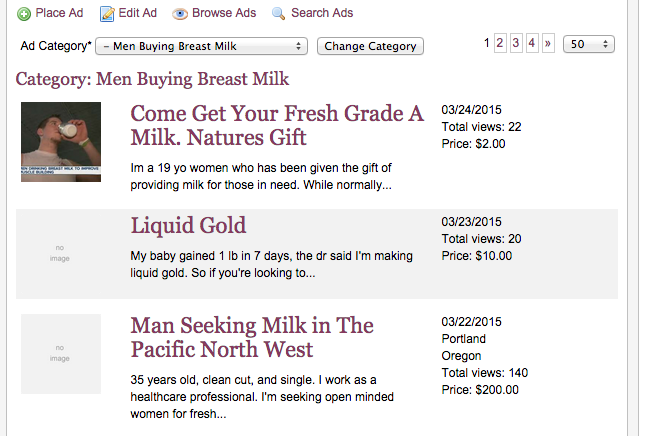Image: Mark Cato/Flickr
The online market for breast milk is booming right now. Not only are parents bombarded with the message that "breast is best," but a niche adult market has recently blossomed in the form of bodybuilders and CrossFitters who claim human breast milk has powers as a workout supplement.But much like anything else you buy on the internet, it's hard to know what you're getting. And that can be particularly troublesome when you're talking about a bodily fluid.An editorial in the British Medical Journal argues that the online breast milk market—which thrives on specially built forums as well as generic marketplaces like Craigslist—is in urgent need of regulation."What we've identified is that there's this growing market," said Sarah Steele, a lecturer at Queen Mary University who wrote the piece. She said the authors had spoken to providers and found that membership on forums was growing. There's a lot of regulation around official milk banks, but in many places access to these is restricted based on need. In others, it's also expensive—the authors say an ounce of breast milk from a US bank can cost up to $4. These services are usually for sick or premature infants and overseen by health services. Online peer-to-peer-style operations, where business is done through forums and classified ads, is often cheaper but not subject to such regulation or screening processes.That means you don't know if the milk you're buying could risk transmitting disease. Steele pointed out that some diseases like HIV and hepatitis aren't always symptomatic before they're transmissible, so a seller or donor might not even know they're affected.Then there's the issue of contamination: a lack of pasteurisation, poor packaging or shipping could lead to bacterial growth. One study found 74 percent of internet milk samples didn't meet safety standards, some of them containing bacteria from fecal matter.In other cases, breast milk might be purposefully diluted with other substances for profit. "Specifically because the milk is sold by the ounce, there's a real prospect of topping it up with cow's milk or water, or other things that aren't optimal for infant nutrition," said Steele.Milk bought online could also have been frozen and thawed several times over, or stored in plastic containing BPA, a compound banned for use in baby bottles by the EU and Canada.Consumers don't have the tools to test the things they buy online, and it wouldn't be feasible to do for every package you receive.Steele and her coauthors suggest that more research into the online market for breast milk is needed, as studies so far have been relatively small. In addition to legal regulation—including a framework that would hold those who intentionally tamper with products to account—they want to see greater public information on the practice. Lots of parents might think they're doing the best for their child by sourcing breast milk if they can't provide it themselves, and might not be aware of the risks.Steele emphasised that contaminated milk can be dangerous to adults too. As well as the burgeoning diet and fitness markets, they found adult consumers include cancer patients and fetishists."These risks to infants also translate to adults," she said. "Breast milk is a bodily fluid and ultimately it therefore contains viruses and bacteria, and if it's not properly screened it poses risks to adults as well."
There's a lot of regulation around official milk banks, but in many places access to these is restricted based on need. In others, it's also expensive—the authors say an ounce of breast milk from a US bank can cost up to $4. These services are usually for sick or premature infants and overseen by health services. Online peer-to-peer-style operations, where business is done through forums and classified ads, is often cheaper but not subject to such regulation or screening processes.That means you don't know if the milk you're buying could risk transmitting disease. Steele pointed out that some diseases like HIV and hepatitis aren't always symptomatic before they're transmissible, so a seller or donor might not even know they're affected.Then there's the issue of contamination: a lack of pasteurisation, poor packaging or shipping could lead to bacterial growth. One study found 74 percent of internet milk samples didn't meet safety standards, some of them containing bacteria from fecal matter.In other cases, breast milk might be purposefully diluted with other substances for profit. "Specifically because the milk is sold by the ounce, there's a real prospect of topping it up with cow's milk or water, or other things that aren't optimal for infant nutrition," said Steele.Milk bought online could also have been frozen and thawed several times over, or stored in plastic containing BPA, a compound banned for use in baby bottles by the EU and Canada.Consumers don't have the tools to test the things they buy online, and it wouldn't be feasible to do for every package you receive.Steele and her coauthors suggest that more research into the online market for breast milk is needed, as studies so far have been relatively small. In addition to legal regulation—including a framework that would hold those who intentionally tamper with products to account—they want to see greater public information on the practice. Lots of parents might think they're doing the best for their child by sourcing breast milk if they can't provide it themselves, and might not be aware of the risks.Steele emphasised that contaminated milk can be dangerous to adults too. As well as the burgeoning diet and fitness markets, they found adult consumers include cancer patients and fetishists."These risks to infants also translate to adults," she said. "Breast milk is a bodily fluid and ultimately it therefore contains viruses and bacteria, and if it's not properly screened it poses risks to adults as well."
Advertisement
Advertisement
